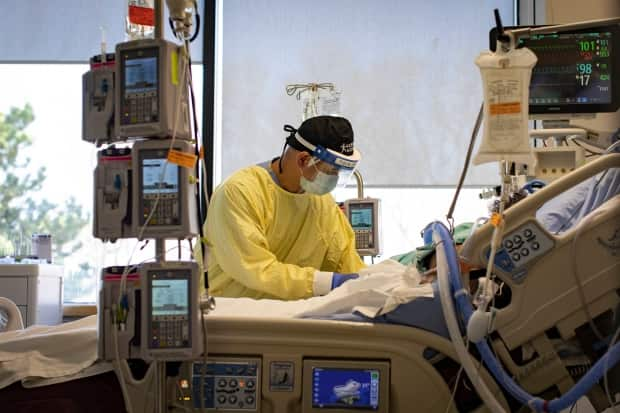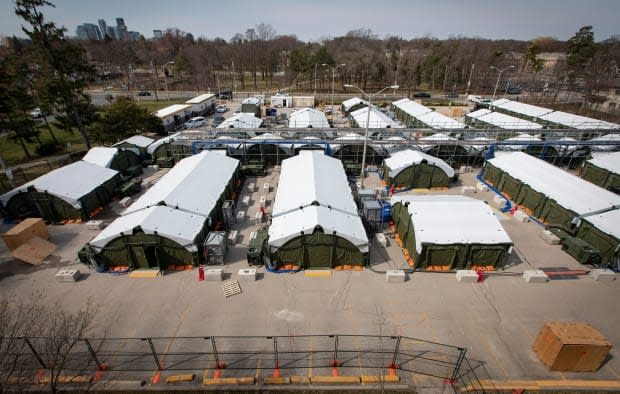'Our situation is dire,' top health official says as Ontario sees 4,736 new COVID-19 cases

Ontario reported 4,736 new cases of COVID-19 — the most ever on a single day — and a third-wave high of 29 more deaths of people with the illness on Thursday as total hospitalizations climbed to more than 1,900.
There are 1,932 patients with COVID-19 in the province's hospitals, according to the Ministry of Health. Of those, 659 are being treated in intensive care for COVID-related illnesses — also a new high — and 623 continue to test positive for the virus. Some 442 people in critical care require a ventilator to breathe.
Critical Care Services Ontario, a government agency that compiles a daily tally of hospitalizations for hospitals and health organizations, says that 64 more people with COVID-19 were admitted to ICUs yesterday alone.
The Ministry of Health told the Canadian Press that Ontario may activate a field hospital that was assembled in the parking lot at Sunnybrook Hospital in Toronto as hospitals in the city and surrounding regions struggle with an influx of patients.
"Unfortunately our situation is dire," Associate Medical Officer of Health Dr. Barbara Yaffe said during a Thursday afternoon news conference.
Yaffe said it's likely that daily cases will remain high for the next while, and the number of people in hospital and intensive care will continue to go up.
"I really wish that I had better news to give you today," she said.

Health Minister Christine Elliott has said Ontario intends to open up hundreds of additional ICU beds in coming days and weeks. As part of that effort, a call went out to the province's 626 long-term care homes, asking them "to do everything they can over the next two weeks to safely admit or readmit hospitalized patients waiting for a space" in a facility.
"We want to immediately fill vacancies that meet individual needs and where the home has the necessary staff to accommodate these moves without compromising the care of current residents," a spokesperson for the Ministry of Long-Term Care said in an email.
The ministry wants to complete up to 1,500 transfers from hospitals to a long-term care facility, the spokesperson said. About 93 per cent of all long-term care residents in Ontario have had both doses of a COVID-19 vaccine, the statement said.
Premier Doug Ford's cabinet is meeting today as one of his top ministers says the Ontario government is extremely concerned about surging cases of the virus.
Solicitor General Sylvia Jones confirmed cabinet is meeting but wouldn't say if the government is contemplating stricter public health measures to tackle soaring infections that are putting immense pressure on the health-care system.
The meeting comes ahead of new pandemic projections set to be released tomorrow by science experts advising the government.
Yaffe said Thursday that the province is "working really hard" with experts on "other potential measures," but did not specify what's being considered.
She told people to keep adhering to current public health measures in the meantime.
"If we don't change what we're doing, things will in fact get worse. That's the bottom line," she said.
Meanwhile, the additional cases reported in today's provincial update include:
1,188 in Toronto.
983 in Peel Region.
526 in York Region.
342 in Ottawa.
216 in Durham Region.
215 in Niagara Region.
181 in Middlesex-London.
150 in Hamilton.
140 in Halton Region.
118 in Simcoe-Muskoka.
102 in Wellington-Dufferin-Guelph.
Moderna shipment delayed
Labs completed 65,559 tests for SARS-CoV-2, the virus that causes COVID-19, and logged a provincewide positivity rate of eight per cent.
The seven-day average of daily cases climbed to 4,208, a new pandemic peak by a considerable margin.
Yaffe said this is a 36 per cent increase over last week's seven-day average.
The 29 further deaths of people with COVID-19 bring the official toll to 7,639. The seven-day average of deaths rose to 20.7 per day, a new high for the third wave of the pandemic. Ontario saw its highest seven-day average for daily deaths in January when it topped 60.
The stark figures come as Ontario learned that another shipment of COVID-19 vaccines from Moderna will be delayed. The shipment of 448,400 doses was scheduled to arrive next week, but now the province says it will not get to Ottawa until May 3 at the earliest.
Provincial officials have pointed to inconsistent deliveries of the Moderna vaccine as a key factor in the current pace of Ontario's immunization campaign.
Yesterday, two major health networks in Toronto announced they would be halting registrations or cancelling appointments entirely because of inadequate supplies of vaccines. Both the University Health Network and the Scarborough Health Network — which serve some of the hardest-hit communities in Ontario — will temporarily shutter mass vaccination clinics until more doses are distributed to their teams.
Ontario has capacity to vaccinate up to 150,000 people daily, the province's vaccine task force says, but is currently averaging about 98,000.
Public health units administered 105,430 shots yesterday, according to the Ministry of Health. A total of 339,491 people in the province have now gotten both doses of a COVID-19 vaccine.
Ontario has used 3,528,404, or about 73 per cent, of the 4,852,885 doses it has received from the federal government to date, though some 303,000 of those total doses arrived only yesterday.
That means there are about 1,324,481 unused doses of vaccines in the province, about half of which are AstraZeneca.
In a series of Twitter posts, Dr. Isaac Bogoch, an infectious disease physician and member of the vaccine task force, said that AstraZeneca is "not exactly flying off the shelves."
The vaccine is currently available for people aged 55 and older and is being distributed through about 1,400 pharmacies and also by primary care doctors in six public health units. Anecdotally, family doctors have reported having trouble filling appointments for doses of the vaccine.
The AstraZeneca product has been linked to rare but serious blood clots. The first instance in Canada was reported on Tuesday.
Variants outpacing vaccinations
Ontario's COVID-19 science advisory table, a group of experts that informs the government's pandemic response, has repeatedly warned that the spread of variants of concern is vastly outpacing the immunization effort. The group says that variants account for about 65 per cent of all new cases in the province, though that figure is likely an underestimate due to delays in testing and lab work.
Local health officials in the Grey Bruce Health Unit, located about 100 kilometres northwest of Toronto on the shores of Lake Huron, are telling residents to stay home for the next two days as variants of concern surge in the region of about 162,000 people. They say the move is necessary after 70 new cases were confirmed in the region in the past 36 hours.
Officials are also shutting down the Grey Bruce Health Unit information line and cancelling a mass vaccination clinic planned for Saturday to redeploy staff to case management and contact tracing.

